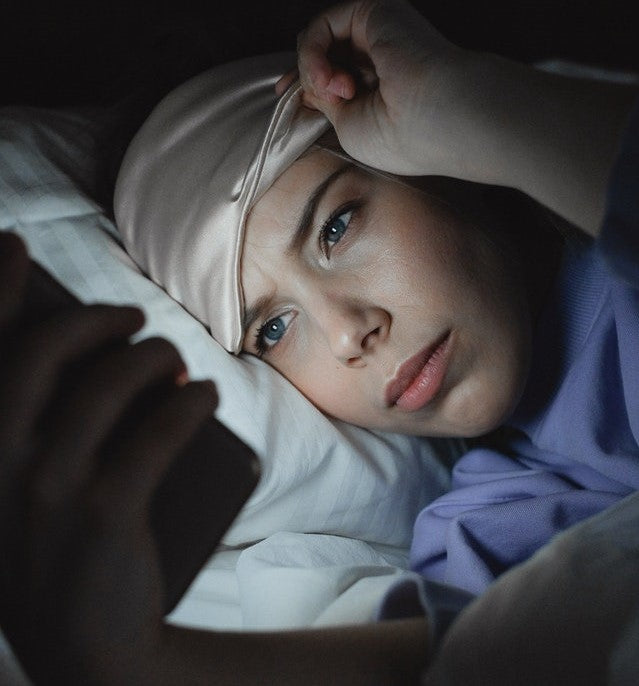WILL CBD HELP ME SLEEP?
Summary points:
- CBD (cannabidiol) has been shown to support sleep by influencing the body’s endocannabinoid system.
- It has also been shown to help shift the body out of a “fight-or-flight” response and contribute to lower stress levels.
- Studies found that CBD can regulate sleep hormones and the body’s circadian rhythm.
Getting enough sleep is fundamental to health and quality of life. It contributes to memory formation, muscle repair, maintaining a strong immune system, and so much more.
Experts recommend seven to nine hours of sleep every night for adults to feel energised and healthy the next day. However, according to data published in The Guardian, approximately 35% of adults in the UK sleep less than the recommended minimum of 7 hours each night. The standard approach to relieving sleeping troubles is using sleeping medications, improving your sleep environment, and more recently, using natural sleeping aids, such as CBD.
To best understand how you can improve your sleep, it’s important to identify what may be causing your sleeping difficulties.
Reasons you might not be sleeping
Stress
Stress and sleep are very closely linked. While too much stress can make it impossible to sleep, a lack of sleep may further increase stress levels.
An unhealthy lifestyle and poor work-life balance are often the leading causes of stress, as the mind doesn’t have enough time to unwind and fully process the thoughts from the day.
Although stress can be detrimental to our health, we've evolved to feel stress to have the best chance at surviving dangerous or life-threatening situations.
Stress causes the autonomic nervous system to release high levels of adrenaline and cortisol, which raises our heart rate to circulate more blood throughout our body, keeping us alert and ready for action. This is our fight-or-flight response, and it's key to our survival.
The problem is that with our mind and body being connected, anything we perceive as stressful will cause this physical response, even if it's not dangerous or life-threatening.

Caffeine
According to a 2019 study, people drink 95 million cups of coffee per day in the UK, while 10% of coffee drinkers have six or more cups in a single day. Tea and soft drinks are also popular beverages with a lot of caffeine in them.
When we drink caffeinated beverages, our blood contains the highest levels of caffeine one hour after consumption, and this drops to about half after six to seven hours. Depending on your height, weight, lifestyle, and tolerance, caffeine tends to stay in your system for at least 10-12 hours before it's fully cleared out. That means when having a cup of coffee after lunch, you might still feel the effects of caffeine after midnight.
Caffeine is a stimulant that interacts with our central nervous system. It can cause us to feel more alert by raising our heart rate and blood pressure. While the effects of having a coffee too late in the day play a big role in keeping us up at night, a lack of coffee may also disrupt your sleep. You can build a tolerance to caffeine fairly quickly, and if you have less than your usual daily serving, you may experience symptoms of caffeine withdrawal, such as headaches, irritability, muscle aches, and anxiety.
Daily habits
Our lifestyle is one of the most significant factors influencing how well we sleep at night.
Habits can make or break us, and often when problems arise with our mental and physical health, we can link them to our daily habits.
Too much alcohol or tobacco, not enough exercise, or having meals too late in the day can all mess with your sleep.
Our bodies need time to unwind at night, and watching TV or scrolling on our phones doesn't really cut it.
Researchers found that screen time delays our natural production and release of melatonin, so turning off any electronic devices at least an hour before bed is best for a restful night's sleep.
Another common saboteur is not having a consistent sleep schedule. Our body produces hormones for various purposes throughout the day by anticipating repeated behaviours and following our circadian rhythm.
Maintaining a consistent bedtime will allow our body to adapt and release sleep hormones around the same time every night, contributing to a more regular sleep pattern.

Physical & mental health conditions
In the UK, nearly 10 million people suffer from pain in their day-to-day life, interfering with everything from their performance in work down to the quality of their sleep. That could be chronic pain from ongoing health conditions, pain caused by minor injuries, or pain from keeping a poor posture all day. Unfortunately, studies found that not getting enough sleep increases your pain sensitivity, making the problem even worse.
Mental health conditions such as anxiety, depression, or PTSD are also common causes for losing sleep. Even when you find you´re sleeping more than usual, these conditions can take a toll on the brain's ability to process information and may lead to a lower quality of sleep. It's becoming clear that there´s a relationship between mental health and sleep, and a lack of sleep can be both a cause and consequence of mental health conditions.
Other medications
Since so many processes in our bodies are connected, it makes it difficult to treat an issue without creating another. Several medications may negatively impact your sleep, keeping you up at night or making you feel drowsy throughout the day. Since chemicals affect everybody differently, you may experience sleeping difficulties from medications where others don't. If you notice any medications disrupting your natural sleeping patterns, it's best to consult with your doctor about it.
How CBD may contribute to improved sleep
CBD, or cannabidiol, is a natural cannabinoid found in hemp.
Unlike THC (tetrahydrocannabinol), which is the main intoxicating component of the cannabis plant, CBD is not intoxicating, so it will not make the user ‘high’.
On the contrary, numerous studies have shown that CBD offers a range of potential health benefits.
When consumed, CBD influences the endocannabinoid system (ECS), a network of receptors and transmitters located throughout the body.
The ECS is responsible for maintaining a balance between our body's cardiovascular, nervous, and immune system functions, and regulates many vital functions, such as sleep, mood, pain and appetite.
CBD interacts with this network of receptors by imitating the body’s own naturally-produced endocannabinoids (“endogenous cannabinoids”).
In this way, it supports the function of the ECS and helps the body to better adapt to changes in environment.
Unfortunately, the endocannabinoid system is susceptible to our environment, and several factors may weaken it.
Studies have found that prolonged exposure to cortisol decreases our endocannabinoid levels, and chronic stress may suppress the function of CB1-type cannabinoid receptors.
With a lack of cannabinoids and functioning receptors, our ECS can't properly regulate all the processes it should.

What the research says about CBD and sleep
Studies have found that CBD may regulate our sleep-wake cycle and help us sleep more soundly.
One of the ways it does this is by directly influencing the amount of adenosine produced by the body.
Adenosine is a compound that regulates feelings of tiredness: high adenosine levels will make us feel tired, while low levels will make us feel more awake. CBD won't make your body produce more adenosine than it naturally would, it just helps your body to regulate it better.
This is also why CBD won't make you drowsy during the day, as it supports the body’s natural rhythm.
The most important thing when it comes to sleep is the quality of our sleep. If you've slept nine hours but the quality of sleep was poor, you most likely won't feel great the next day - even though you slept the recommended nine hours.

We go through multiple stages when we sleep, one of the most important being our Rapid Eye Movement (REM) stage. Our brain processes all the information from the day and helps form new connections according to that information.
For instance, if you're studying for an exam and review a lesson many times, only by sleeping on it will the information move into your long-term memory.
While sleeping drugs will help you fall asleep and stay asleep, many of them will block REM sleep, leaving you feeling groggy and irritable during the day. CBD, however, may support natural REM sleep by increasing the level of endocannabinoids in our body, which are responsible for regulating our sleep cycle.
CBD Oil Dosage for Sleep
Everyone's ideal CBD dosage is different. Factors such as height, weight, activity levels, and tolerance determine how much CBD you should take to get the best results.
You can use our CBD Dosage Calculator to find your optimal CBD oil dosage.
We have a variety of CBD products that you can easily build into your routine. CBD oil tends to work the fastest, and you can easily apply a few drops under your tongue before going to bed.
If you're unsure when to take CBD oil, you can try taking it half an hour to an hour before going to bed.
It's generally best to start with a low dosage and gradually increase the amount of CBD you take when needed.

CBD oil can also be taken with melatonin to support sleep. However, this combination is only available in Germany and other EU countries as melatonin isn't available without a prescription in the UK. Melatonin is a hormone naturally produced by the body to fall asleep. CBD melatonin oil can help you fall asleep faster and sleep deeper throughout the night without building up a tolerance or becoming dependent on it. Research suggests that CBD may even enhance the effectiveness of melatonin.
If you prefer using CBD in edible form, we have CBD snacks, including gummies and cookies, which you can try adding to your meal a few hours before bed. There are also ways CBD can enhance your evenings in the form of CBD beauty products, such as CBD Massage Oil or a Purify CBD Clay Mask! Or, if you want to keep things simple but don't like taking CBD oil, you can take our CBD capsules which are also available in a vegan option.
CBD side effects
According to the World Health Organization, “CBD is generally well tolerated with a good safety profile.” If you take the right amount, it's unlikely you´ll experience any side effects. Dry mouth, diarrhoea, reduced appetite, drowsiness, and fatigue are the main reported side effects of CBD. It's important to note that CBD can also interact with other medications you´re taking and potentially alter their effects negatively, so be sure to consult with your doctor first.
Other uses for CBD
The great thing about CBD is that it supports our ECS in its duties by allowing for more accessible communication between various body parts. Our ECS regulates several vital functions: sleep, mood, appetite, pain management, stress regulation, and more.
CBD essentially supports our body in maintaining good health — which naturally comes with plenty of benefits. According to studies, CBD use is correlated with reduced pain and inflammation, lower levels of stress and anxiety, and good skin health.
Conclusion
Sleep is fundamental to our health and wellbeing, yet millions of people in the UK struggle to get enough sleep. It's important to try and identify the root cause behind your sleeping difficulties in order to fix them. For many people, that may be stress or a hectic lifestyle; for others, it could be caused by unhealthy habits. Either way, not getting enough sleep can cause further health issues down the line.
CBD can help with a lot of things because of how it interacts with our endocannabinoid system. Our ECS plays a big role in how we sleep; it´s responsible for adjusting our circadian rhythm, turning off our fight-or-flight mode, and regulating our sleep hormones (adenosine) for when we need them. If our ECS is weak, it can´t take care of all these functions as it should. And that's where CBD comes in. CBD helps your body adapt to any changes or problems, which can in turn contribute to improved sleep.
You can try taking a couple of drops of CBD oil; however, if your sleeping difficulties persist, we advise you to consult with a doctor.
References
- https://www.sleepassociation.org/sleep-treatments/cbd/
- https://pubmed.ncbi.nlm.nih.gov/11303075/
- https://www.webmd.com/sleep-disorders/sleep-deprivation-effects-on-memory
- https://www.sleep.org/how-sleep-adds-muscle/
- https://www.ncbi.nlm.nih.gov/pmc/articles/PMC3256323/
- https://www.sleepfoundation.org/how-sleep-works/how-much-sleep-do-we-really-need
- https://www.theguardian.com/society/2018/feb/25/britons-epidemic-sleeplessness-damaging-health
- https://www.medicalnewstoday.com/articles/322994#stress-and-sleep
- https://www.ceutagroup.com/the-coffee-market-in-2019/
- https://www.medicalnewstoday.com/articles/321784
- https://www.healthline.com/health/caffeine-effects-on-body
- https://www.medicalnewstoday.com/articles/324768
- https://www.sleepfoundation.org/teens-and-sleep/screen-time-and-insomnia-for-teens
- https://www.ncbi.nlm.nih.gov/pmc/articles/PMC2769007/
- https://www.britishpainsociety.org/media-resources/
- https://pubmed.ncbi.nlm.nih.gov/30692228/
- https://www.sleepfoundation.org/mental-health
- https://pubmed.ncbi.nlm.nih.gov/28928187/
- https://www.everydayhealth.com/sleep/medications-that-affect-sleep.aspx
- https://www.webmd.com/sleep-disorders/sleep-101
- https://blogs.unimelb.edu.au/sciencecommunication/2017/10/10/sleeping-tablets-how-do-they-affect-your-sleep/
- https://link.springer.com/article/10.1007/s11920-017-0775-9
- https://www.who.int/medicines/access/controlled-substances/CannabidiolCriticalReview.pdf
- https://www.health.harvard.edu/blog/cbd-and-other-medications-proceed-with-caution-2021011121743
- https://www.aviva.com/newsroom/news-releases/2017/10/Sleepless-cities-revealed-as-one-in-three-adults-suffer-from-insomnia/
- https://www.ncbi.nlm.nih.gov/pmc/articles/PMC4677118/
- https://www.ncbi.nlm.nih.gov/pmc/articles/PMC6326553/
- https://pubmed.ncbi.nlm.nih.gov/14746372/
- https://www.medicalnewstoday.com/articles/endocannabinoid
Disclaimer: There is currently insufficient evidence to support the use of CBD in the condition(s) mentioned above and this text by no means reflects recommended uses. Always seek the advice of your healthcare professional if you are taking prescribed medication or are thinking of using CBD for your condition.



